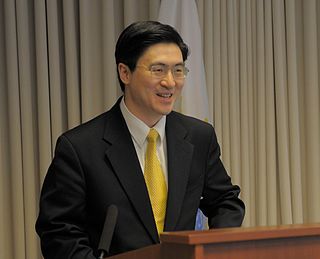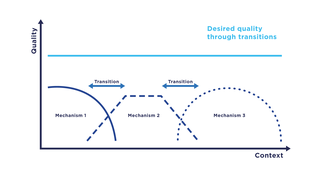
Peter David Lebling is an American interactive fiction game designer (implementor) and programmer who has worked at various companies, including Infocom and Avid.
Donald Fred Towsley is an American computer scientist who has been a distinguished university professor in the College of Information and Computer Sciences at the University of Massachusetts Amherst.
The Internet Technical Committee (ITC) is a joint committee of the Internet Society (ISOC) and the IEEE Communications Society (ComSoc). The Internet Technical Committee was officially created in December 1994.
MPLS Fast Reroute is a local restoration network resiliency mechanism. It is actually a feature of resource reservation protocol (RSVP) traffic engineering (RSVP-TE). In MPLS local protection each label-switched path (LSP) passing through a facility is protected by a backup path which originates at the node immediately upstream to that facility.

Jim Kurose is a Distinguished University Professor in the College of Information and Computer Sciences at the University of Massachusetts Amherst.
A greedy source is a traffic generator in a communication network that generates data at the maximum rate possible and at the earliest opportunity possible. Each source always has data to transmit, and is never in idle state due to congestion avoidance or other local host traffic shaping. One new data-packet is generated when the transmission of previous packet is completed, meaning that the sender side queue is never congested. A greedy session is a time-limited packet flow or data stream at maximum possible rate.
Virtual output queueing (VOQ) is a technique used in certain network switch architectures where, rather than keeping all traffic in a single queue, separate queues are maintained for each possible output location. It addresses a common problem known as head-of-line blocking.
The IEEE Annual Symposium on Foundations of Computer Science (FOCS) is an academic conference in the field of theoretical computer science. FOCS is sponsored by the IEEE Computer Society.
Data center bridging (DCB) is a set of enhancements to the Ethernet local area network communication protocol for use in data center environments, in particular for use with clustering and storage area networks.

Mung Chiang is a Chinese-American academic administrator, telecommunications engineer, and professor. He currently serves as the 13th President of Purdue University.
In queueing theory, a discipline within the mathematical theory of probability, Beneš approach or Beneš method is a result for an exact or good approximation to the probability distribution of queue length. It was introduced by Václav E. Beneš in 1963.

Transition refers to a computer science paradigm in the context of communication systems which describes the change of communication mechanisms, i.e., functions of a communication system, in particular, service and protocol components. In a transition, communication mechanisms within a system are replaced by functionally comparable mechanisms with the aim to ensure the highest possible quality, e.g., as captured by the quality of service.
Richard Lewis Mattson is an American computer scientist known for his pioneering work on using memory trace data to simulate the performance of the memory hierarchy. He developed the stack distance profile, and used it to model page misses in virtual memory systems as a function of the amount of real memory available. The same methods have been applied as well more recently for modeling the behavior of CPU caches at lower levels of the memory hierarchy, and of web caches for internet content.

Moustafa Youssef is an Egyptian computer scientist who was named Fellow of the Institute of Electrical and Electronics Engineers (IEEE) in 2019 for contributions to wireless location tracking technologies and a Fellow of the Association for Computing Machinery (ACM) in 2019 for contributions to location tracking algorithms. He is the first and only ACM Fellow in the Middle East and Africa.
Wonjun Lee is a professor of Department of Cyber Defense, School of Cybersecurity at Korea University in Seoul, Republic of Korea. His research interests include communication and network protocols, wireless communication and networking optimization techniques, security and privacy in mobile computing, and RF-powered computing and networking. He has authored 15 international patents, over 250 papers in refereed international journals and conferences, and a book “Optimal Coverage in Wireless Sensor Networks,” Springer, 2020.
Chao-Ju Jennifer Hou was a Taiwanese computer scientist and electrical engineer specializing in wireless sensor networks.
Can Emre Koksal is an electrical engineer, computer scientist, academic, and entrepreneur. He is the Founder and CEO of Datanchor, and a professor of Electrical and Computer Engineering at Ohio State University.
Ness B. Shroff is an American engineer, educator and researcher known for contributions to wireless networking, network control, and network analysis. He is professor in ECE and CSE departments at Ohio State University, where he holds the Ohio Eminent Scholar Chaired Professorship of Networking and Communications.




